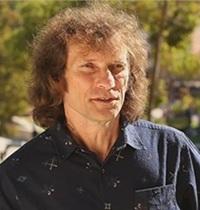The Prizewinner 2025

| Name | Dr. David Andrew Keith |
|---|---|
| Born on | 6 November 1959 |
| Nationality | Australia |
| Title | Professor of Botany, Centre for Ecosystem Science, University of NSW |
Reasons for the Award
Since the beginning of his research career, Dr. Keith has dedicated himself to studying Australia’s native flora and vegetation. His authoritative work, Ocean Shores to Desert Dunes: The Native Vegetation of New South Wales and the ACT, which provides a comprehensive account of the vegetation of New South Wales, is widely referenced by both experts and the general public alike. With his research on the impacts of fire on natural ecosystems (fire ecology), he predicted dependence of plants on wildfires using plant functional traits, demonstrating the crucial role that regular wildfires play in maintaining Australia’s unique ecosystems. These findings hold universal significance for our understanding of the relationship between wild vegetation and fires in regions prone to wildfires around the world.
Dr. Keith has also achieved remarkable accomplishments in the field of conservation biology with extensive studies on predicting, detecting, and evaluating the extinction risks of species due to climate change. Notably, he has led a series of joint international studies on the establishment of the IUCN (International Union for Conservation of Nature and Natural Resources) Red List of Ecosystems, a new protocol for assessing the risk of ecosystem collapse, an area that previously lacked clear standards, and has been instrumental in promoting its adoption worldwide.
A globally applicable classification system with clearly defined targets is essential to the effective conservation of the planet’s diverse ecosystems. Dr. Keith has also conducted research on classifying ecosystems for conservation purposes, spearheading international collaborative studies on typification of all ecosystems around the world (natural and artificial, terrestrial, subterranean, freshwater, and marine), with a focus on ecosystem functions. This work resulted in the creation of the IUCN Global Ecosystem Typology 2.0, a groundbreaking framework that has made it possible to evaluate the risk of ecosystem collapse.
As noted, Dr. Keith’s work has developed from ecological studies on plants native to Australia to research on assessing the risk of ecosystem collapse from a global perspective, and to the classification of ecosystems worldwide. Ecosystems represent the complex web of interactions among all life forms on Earth. Today, with human activity accelerating biodiversity loss, the conservation of ecosystems, which are fundamental components of biodiversity at the highest level, has become a matter of urgent importance. Dr. Keith’s pioneering work on the development of macro-level methods for assessing ecosystems and his research on ecosystem conservation have been recognized as highly deserving of the International Cosmos Prize, which emphasizes holistic, integrated perspectives and universal relevance.
Professional Preparation
1981 BSc(Hons) University of Sydney1991 PhD University of Sydney
Appointments
| 1982 - 1986 | Technical Officer, National Herbarium of NSW |
| 1995-1996 | Research Officer, Tasmanian Parks and Wildlife Service |
| 1986-2022 | After serving as Research Officer and other positions, Senior Principal Research Scientist, NSW National Parks and Wildlife Service and NSW Office of Environment & Heritage |
| 2012-Present | Professor of Botany, Centre for Ecosystem Science, University of NSW |
International awards and honours
2013 Australian Ecology Research Award, Ecological Society of Australia
2015 Eureka Prize for Environmental Research (team lead, Red List of Ecosystems)
2017 The Clarke Medal, Royal Society of NSW
2019 NSW Premier’s Prize for Environmental Science
2020 Luc Hoffmann Award, IUCN Commission on Ecosystem Management
2021 Eureka Prize for Environmental Research(team member, NSW Bushfire Research Hub)
2022 Ecological Impact Award, Ecological Society of Australia (team member, Wildlife and Habitat Bushfire Recovery Partnership)
2023 Elected Fellow, Australian Academy of Science
2023 Gold Medal, Ecological Society of Australia
2024 Eureka Prize for Botanical Science
Books etc.
1. Keith DA, Ferrer-Paris JR, Nicholson E. et al. (2022) A function-based typology for Earth’s ecosystems.
Nature 610, 513–518. [doi: 10.1038/s41586-022-05318-4]
2. Keith, DA (2017) 'Australian Vegetation', Cambridge University Press, Cambridge.
3. Keith, DA (2004) 'Ocean Shores to Desert Dunes: The Native Vegetation of New South Wales and the ACT'.
NSW Department of Environment and Conservation, Sydney.
4. Keith D.A, Rodríguez JP, Rodríguez-Clark KM. et al. (2013) Scientific foundations for an IUCN Red List of Ecosystems.
PLoS ONE 8(5), e62111.
5. Nicholson E; Watermeyer KE; Rowland JA; … Keith DA et al. (2021) Scientific foundations for an ecosystem goal,
milestones and indicators for the post-2020 Global Biodiversity Framework. Nature Ecology and Evolution 5,
1338–1349. [doi: 10.1038/s41559-021-01538-5]
6. Keith, D.A., Akcakaya, H.R., Thuiller, W., et al. (2008) 'Predicting extinction risks under climate change:
7. Keith DA, Rodríguez JP, Brooks TM et al. (2015). The IUCN Red List of Ecosystems:motivations,
challenges and applications. Conservation Letters 8, 214-226. [doi:10.1111/conl.12167]
8. Obura D, Gudka M, Samoilys M, … Keith DA et al., F. (2022) 'Vulnerability to collapse of coral reef ecosystems in the
Western Indian Ocean', Nature Sustainability 5, 104–113.
9. Keith DA, Benson DH, Baird IRC et al. (2023) Effects of interactions between anthropogenic stressors and recurring
perturbations on ecosystem resilience and collapse. Conservation Biology 37(1), e13995. [DOI:10.1111/cobi.13995]
10. Possingham HP, Andelman SJ, Burgman MA… & Keith, DA (2002) Limits to the use of threatened species lists.
Trends in Ecology and Evolution 17, 503-507
11. Tóth AB, Terauds A, Chown SL, … & Keith DA (2025). A dataset of Antarctic ecosystems in ice-free lands:
classification, descriptions, and maps. Scientific Data 12, 133. [https://doi.org/10.1038/s41597-025-04424-y]
12. Nicholson E, Andrade A, Brooks TM, … Keith DA et al. (2024) Roles of the Red List of Ecosystems in the
Kunming-Montreal Global Biodiversity Framework. Nature Ecology & Evolution 8, 614–621.
https://doi.org/10.1038/s41559-023-02320-5
